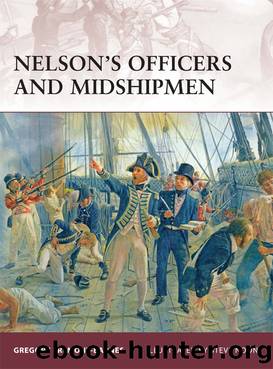Nelson's Officers and Midshipmen by Gregory Fremont-Barnes

Author:Gregory Fremont-Barnes
Language: eng
Format: epub
Tags: Nelson’s Officers and Midshipmen
ISBN: 9781472804570
Publisher: Osprey Publishing
Boarding action led by a lieutenant of HMS Surprise, retaking HMS Hermione off Puerto Cabello, Venezuela, in October 1799, two years after the crew had mutinied and handed the ship over to the Spanish. (Stratford Archive)
At sea the first lieutenant stood no watch at night, but was expected to be on duty on the decks throughout the course of the day and to come up during night watches when danger threatened or problems required his presence. A lieutenant of the watch had to see that the helmsmen kept the ship on course, that the log was updated every hour, and that the rate of sailing was marked on the board that stood on the quarterdeck. The men had to be monitored to see that they were alert and properly turned out, at their correct stations, and ready to carry out the next order, whenever that might be issued. Further, according to Falconer: ‘The first lieutenant is to prevent all profane swearing and abusive language; all disturbance, noise, and confusion; to enforce a strict obedience to orders, a proper respect to all superiors, and an observance of discipline and good order; and he is to report to the captain all those whose misconduct he shall think deserving of reprehension or punishment.’
The lieutenant had to ensure that the midshipmen and master’s mates performed their duties. He had to muster the watch, keep the ship in her station within the squadron or fleet, and to report the sighting of unidentified ships and shifts of wind. He had to make sure that the lookout men at the mastheads and elsewhere were awake and did not remain too long at their stations. When the captain was in his quarters in the evening and an unidentified ship (known to contemporaries as a ‘strange sail’) was sighted, he sent a midshipman to inform the captain. While the captain got dressed to come to the quarterdeck, the lieutenant got the ship ready for action, keeping the vessel beyond gunshot until the captain and crew were ready. During the night, he was to be particularly attentive in seeing that the master-at-arms and corporals made their appointed half-hourly rounds of all sections of the ship to see that no trouble existed amongst the men, that no candles or lamps were burning (apart from those specifically allowed), that no one was smoking, except in the galley, and that sentinels stood at their appointed positions. Further, as Falconer observed, ‘The lieutenant who commands the watch at sea, keeps a list of all the officers and men thereto belonging, in order to muster them when he judges it expedient, and report to the captain the names of those who are absent from their duty.’
A lieutenant had to ensure that the men kept themselves clean, that the hammocks were washed and the men’s clothes scrubbed. The task of inspecting the ship’s firearms fell to the junior lieutenants, who also led the men in musketry practice, for at some point sailors might be required to fight on shore.
Download
This site does not store any files on its server. We only index and link to content provided by other sites. Please contact the content providers to delete copyright contents if any and email us, we'll remove relevant links or contents immediately.
| Africa | Americas |
| Arctic & Antarctica | Asia |
| Australia & Oceania | Europe |
| Middle East | Russia |
| United States | World |
| Ancient Civilizations | Military |
| Historical Study & Educational Resources |
The Dawn of Everything by David Graeber & David Wengrow(1705)
The Bomber Mafia by Malcolm Gladwell(1622)
Facing the Mountain by Daniel James Brown(1553)
Submerged Prehistory by Benjamin Jonathan; & Clive Bonsall & Catriona Pickard & Anders Fischer(1455)
Wandering in Strange Lands by Morgan Jerkins(1425)
Tip Top by Bill James(1414)
Driving While Brown: Sheriff Joe Arpaio Versus the Latino Resistance by Terry Greene Sterling & Jude Joffe-Block(1374)
Red Roulette : An Insider's Story of Wealth, Power, Corruption, and Vengeance in Today's China (9781982156176) by Shum Desmond(1359)
Evil Geniuses: The Unmaking of America: A Recent History by Kurt Andersen(1352)
The Way of Fire and Ice: The Living Tradition of Norse Paganism by Ryan Smith(1336)
American Kompromat by Craig Unger(1315)
F*cking History by The Captain(1302)
It Was All a Lie by Stuart Stevens;(1298)
American Dreams by Unknown(1285)
Treasure Islands: Tax Havens and the Men who Stole the World by Nicholas Shaxson(1272)
Evil Geniuses by Kurt Andersen(1256)
White House Inc. by Dan Alexander(1210)
The First Conspiracy by Brad Meltzer & Josh Mensch(1173)
The Fifteen Biggest Lies about the Economy: And Everything Else the Right Doesn't Want You to Know about Taxes, Jobs, and Corporate America by Joshua Holland(1125)
